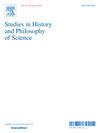Not wasted on the young: Childhood, trait complexes & human behavioral ecology
IF 1.8
2区 哲学
Q1 HISTORY & PHILOSOPHY OF SCIENCE
引用次数: 0
Abstract
Hypotheses about the evolution of multi-trait organismal features often encounter trade-offs between the precision and historical relevance of tests performed in actualistic contexts. That is, highly precise tests aimed at discriminating between competing hypotheses often incur a risk of explanatory misalignment with the historical phenomenon they target. We illustrate this via a discussion of the evolution of childhood. We argue childhood is a trait complex, consisting of multiple, diverse components: patterns of growth, feeding strategies, staggered skill acquisition, and social dependence. The potential of their independent evolution bears important consequences for the evolutionary significance of tests probing the adaptive benefits of childhood in contemporary foraging communities. Via ‘isolation-testing’ such investigations aim for precision at the cost of historical relevance in a potentially serious way. We suggest that integrative investigations relying on the timing and context of components' evolution, emphasizing historical relevance, frame evolutionary hypotheses more reliably than the emphasis on precise tests currently common, thus bearing a higher explanatory potential.
不浪费在年轻人身上:童年、特质复合体与人类行为生态学。
关于多性状有机体特征进化的假设经常遇到在实际环境中进行的测试的准确性和历史相关性之间的权衡。也就是说,旨在区分相互竞争的假设的高度精确的测试,往往会招致与其所针对的历史现象的解释不一致的风险。我们通过对童年进化的讨论来说明这一点。我们认为童年是一个特征综合体,由多种不同的组成部分组成:生长模式、喂养策略、交错技能习得和社会依赖。它们独立进化的潜力,对探索童年在当代觅食群落中的适应性利益的测试的进化意义具有重要影响。通过“隔离测试”,这样的调查旨在以一种潜在的严重方式以牺牲历史相关性为代价来追求准确性。我们建议,综合研究依赖于组件进化的时间和背景,强调历史相关性,构建进化假设比强调目前常见的精确测试更可靠,因此具有更高的解释潜力。
本文章由计算机程序翻译,如有差异,请以英文原文为准。
求助全文
约1分钟内获得全文
求助全文
来源期刊

Studies in History and Philosophy of Science
管理科学-科学史与科学哲学
CiteScore
2.50
自引率
10.00%
发文量
166
审稿时长
6.6 weeks
期刊介绍:
Studies in History and Philosophy of Science is devoted to the integrated study of the history, philosophy and sociology of the sciences. The editors encourage contributions both in the long-established areas of the history of the sciences and the philosophy of the sciences and in the topical areas of historiography of the sciences, the sciences in relation to gender, culture and society and the sciences in relation to arts. The Journal is international in scope and content and publishes papers from a wide range of countries and cultural traditions.
 求助内容:
求助内容: 应助结果提醒方式:
应助结果提醒方式:


